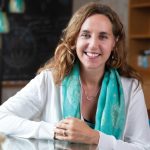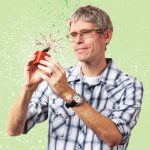One of the characteristic hallmarks of Alzheimer’s disease (AD) is the buildup of amyloid-beta plaques in the brain. Most therapies designed to treat AD target these plaques, but they’ve largely failed in clinical trials. New research by Professor Greg Lemke and Youtong Huang, a postdoctoral researcher and first author of the study, upends conventional views of the origin of one prevalent type of plaque, indicating a reason why treatments have been unsuccessful. The research suggests that dense-core plaques play a protective role, so treatments to destroy them may do more harm than good.
Read news releaseAging
Salk scientists reveal how brain cells in Alzheimer’s go awry, lose their identity
Despite the prevalence of Alzheimer’s, there are still no treatments, in part because it has been challenging to study how the disease develops. Now, Salk President and Professor Rusty Gage and Jerome Mertens, assistant adjunct professor and first author of a new paper, have uncovered new insights into what goes awry during Alzheimer’s by growing neurons that resemble—more accurately than ever before—brain cells in older patients. And like patients themselves, the afflicted neurons appear to lose their cellular identity. The findings showed that these brain cells are characterized by markers of stress as well as changes in which the cells become less specialized. Interestingly, many of the alterations seen in these cells are similar to what’s been observed in the cells of cancer—another disease linked to aging.
Read news releaseFeatured Stories
 Building a More Resilient WorldThe world is facing an array of health-related crises: COVID-19 and other infectious diseases, climate change, neurodegenerative conditions, cancers and many more. To tackle these daunting challenges, the Institute is embarking on a philanthropic campaign to focus on resilience: the biological adaptability that mitigates the effects of aging, resists disease and restores global wellness.
Building a More Resilient WorldThe world is facing an array of health-related crises: COVID-19 and other infectious diseases, climate change, neurodegenerative conditions, cancers and many more. To tackle these daunting challenges, the Institute is embarking on a philanthropic campaign to focus on resilience: the biological adaptability that mitigates the effects of aging, resists disease and restores global wellness. Susan Kaech – How T cells rememberSalk Professor Susan Kaech, director of the NOMIS Center for Immunobiology and Microbial Pathogenesis, has made it her mission to gain a better understanding of how T cells form, how they exchange molecular signals with the surrounding tissue, and how we can use this knowledge to prevent or treat infections.
Susan Kaech – How T cells rememberSalk Professor Susan Kaech, director of the NOMIS Center for Immunobiology and Microbial Pathogenesis, has made it her mission to gain a better understanding of how T cells form, how they exchange molecular signals with the surrounding tissue, and how we can use this knowledge to prevent or treat infections.
 Carl Procko – Lessons from carnivorous plantsStaff Scientist Carl Procko studies Venus flytraps and their close relatives, Sundew plants, to gain insight into the ultra-fast biochemistry of plants and how they can sense touch. It doesn’t hurt that these bug-eating plants are a great way to get kids—and adults—interested in science.
Carl Procko – Lessons from carnivorous plantsStaff Scientist Carl Procko studies Venus flytraps and their close relatives, Sundew plants, to gain insight into the ultra-fast biochemistry of plants and how they can sense touch. It doesn’t hurt that these bug-eating plants are a great way to get kids—and adults—interested in science. Nuttida Rungratsameetaweemana – Drawing from memoriesNuttida Rungratsameetaweemana, a Salk postdoctoral researcher who studies neuroscience, was introduced to the perplexities of the brain at age 14 during a chance encounter in a hospital waiting room.
Nuttida Rungratsameetaweemana – Drawing from memoriesNuttida Rungratsameetaweemana, a Salk postdoctoral researcher who studies neuroscience, was introduced to the perplexities of the brain at age 14 during a chance encounter in a hospital waiting room.






















































